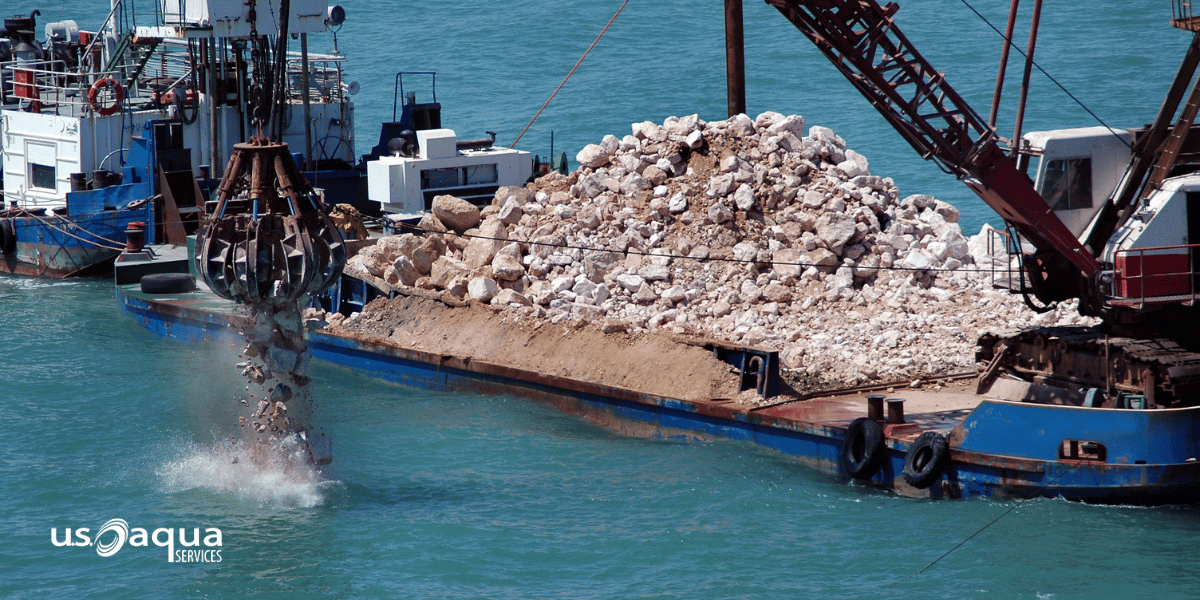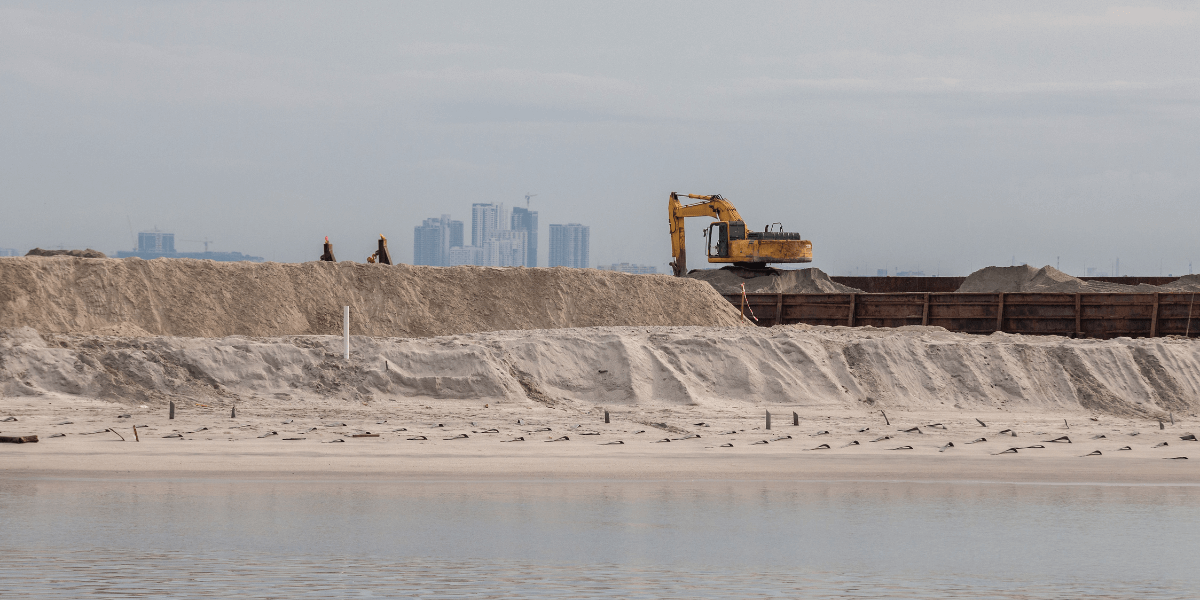Beneficial Uses of Dredged Material: Turning Sediment Into Value
Dredged material, the sediment removed from waterways to maintain navigation, often represents an untapped resource rather than waste. By exploring...
.png)
Beaches are not only crucial for recreation and tourism but also serve as natural barriers protecting coastal ecosystems and human settlements from oceanic forces. While they offer relaxation and enjoyment, maintaining their health is vital due to the natural and human-induced erosion that threatens their stability. Given their importance, understanding the processes involved in maintaining and restoring these precious natural resources is essential.
Let's delve into this blog to explore the intricate processes and beneficial outcomes of beach reclamation and sand dredging, highlighting their critical roles in coastal management and environmental conservation.

Beach reclamation, commonly referred to as beach nourishment, is the process of replenishing eroded beaches with sand from other sources.
This technique is employed to restore the natural aesthetic, recreational utility, and protective function of beaches. It involves not only the addition of new sand but also the reshaping of the beach profile to enhance storm resilience and promote environmental stability.
The procedure is crucial for beaches across various landscapes, including oceanic coasts and lake shores, where erosion can significantly impact local ecosystems and economies.
Erosion naturally occurs from the dynamic interaction of wind, water, and land, but it has been greatly accelerated by factors such as rising sea levels and increased storm activity linked to climate change. In addition, human-induced factors like coastal development and inadequate vegetative cover can exacerbate erosion rates.
Managing this erosion is a critical task that requires both understanding its underlying causes and implementing effective mitigation strategies such as beach reclamation to preserve the coastline. Around the world, erosion has become more visible than ever. For example, Louisiana’s Gulf Coast loses land at an alarming rate, roughly a football field every 100 minutes. Places like Florida and the Carolinas spend millions each year replenishing storm-damaged beaches.
These real-world examples highlight how erosion is not just a natural occurrence, but an escalating issue that requires proactive management through strategies like beach reclamation.
%20(1).png?width=500&height=333&name=A%20large%20dredging%20vessel%20on%20a%20beach%2c%20dredging%20sand%20onto%20the%20coast%2c%20while%20two%20men%20stand%20by%20and%20watch%2c%20services%20and%20equipment%20rentals%20provided%20by%20U.S.%20Aqua%20Services%2c%20your%20leader%20in%20dredging%20services%20%20(3)%20(1).png) The necessity of beach reclamation extends beyond the obvious need to maintain beach area for tourism. Beaches act as crucial buffers against storm surges, protecting inland properties and ecosystems from flooding and damage.
The necessity of beach reclamation extends beyond the obvious need to maintain beach area for tourism. Beaches act as crucial buffers against storm surges, protecting inland properties and ecosystems from flooding and damage.
Additionally, as sea levels rise, the role of beaches in coastal defense becomes even more significant. By restoring beaches, we not only protect economic interests but also support biodiversity and ecological health, which are often impacted by erosion and habitat loss.
In today’s climate-conscious world, beach reclamation projects are also being designed with sustainability in mind. Modern reclamation efforts often use carefully selected sediment that matches the natural grain size of the beach, ensuring minimal disruption to marine ecosystems. Environmental monitoring is frequently built into these projects to safeguard local wildlife, striking a balance between human needs and ecological protection.
Beach reclamation can offer a number of benefits.
![]() Recreational Opportunities: Well-maintained beaches support tourism and local recreation, which are vital for community well-being and economic health. In many coastal towns, reclaimed beaches have revitalized local economies by extending tourist seasons, supporting small businesses, and creating safe spaces for residents.
Recreational Opportunities: Well-maintained beaches support tourism and local recreation, which are vital for community well-being and economic health. In many coastal towns, reclaimed beaches have revitalized local economies by extending tourist seasons, supporting small businesses, and creating safe spaces for residents.
![]() Coastal Protection: Replenished sand provides enhanced protection against coastal erosion and storm damage, safeguarding waterfront properties and habitats. Communities that invest in reclamation often see measurable reductions in storm damage costs, making these projects not only protective but also financially strategic.
Coastal Protection: Replenished sand provides enhanced protection against coastal erosion and storm damage, safeguarding waterfront properties and habitats. Communities that invest in reclamation often see measurable reductions in storm damage costs, making these projects not only protective but also financially strategic.
![]() Environmental Conservation: New sand can help to rebuild dunes and other natural features that support diverse wildlife and plant species, promoting ecological diversity. For example, replenished dunes can provide critical nesting grounds for sea turtles and shorebirds, helping threatened species recover.
Environmental Conservation: New sand can help to rebuild dunes and other natural features that support diverse wildlife and plant species, promoting ecological diversity. For example, replenished dunes can provide critical nesting grounds for sea turtles and shorebirds, helping threatened species recover.
![]() Community Resilience: Healthy beaches contribute to overall community resilience by providing places of refuge and relaxation while supporting local economies. Beyond economics, healthy beaches offer residents a sense of stability and security, reinforcing mental and social well-being in coastal regions.
Community Resilience: Healthy beaches contribute to overall community resilience by providing places of refuge and relaxation while supporting local economies. Beyond economics, healthy beaches offer residents a sense of stability and security, reinforcing mental and social well-being in coastal regions.
Sand dredging is an important and fundamental process for beach reclamation or nourishment, where the issue of beach erosion needs to be mitigated. It's essentially a form of excavation that is carried out underwater, specifically in shallow seas or freshwater areas. Its primary purpose is to preserve the existing shoreline by adding sand back to a beach that is suffering from erosion.
The sand dredging process involves the use of large machinery, typically a dredger. The dredger is equipped with a device that functions much like a vacuum, sucking up sand, silt, and other sediment from the ocean floor. The collected material is then transported and deposited onto the beach or shoreline, thereby bolstering its structure and compensating for the sand lost to erosion.
This practice is typically employed to combat the adverse effects of coastal erosion, maintain navigable waterways, or create new land from the sea or riverbeds. For beach reclamation, sand dredging helps to replace the sand that is carried away by wave action and currents, essentially 'reclaiming' the beach and preserving its appearance and usability.
%20(1).png?width=500&height=333&name=A%20large%20dredging%20vessel%20on%20a%20beach%2c%20dredging%20sand%20onto%20the%20coast%2c%20while%20two%20men%20stand%20by%20and%20watch%2c%20services%20and%20equipment%20rentals%20provided%20by%20U.S.%20Aqua%20Services%2c%20your%20leader%20in%20dredging%20services%20%20(4)%20(1).png) Modern dredging technology has advanced significantly in recent years. Today’s dredgers can be equipped with GPS guidance, real-time monitoring, and eco-friendly suction systems that minimize turbidity in the water. These innovations allow dredging companies to complete projects more efficiently and with less environmental impact, meeting stricter regulations while still delivering strong results.
Modern dredging technology has advanced significantly in recent years. Today’s dredgers can be equipped with GPS guidance, real-time monitoring, and eco-friendly suction systems that minimize turbidity in the water. These innovations allow dredging companies to complete projects more efficiently and with less environmental impact, meeting stricter regulations while still delivering strong results.
In addition, artificial intelligence is beginning to play a role in optimizing dredging operations. By analyzing large sets of environmental and operational data, AI can help predict sediment movement, improve dredging accuracy, and even recommend the most energy-efficient settings for equipment. While these systems are still evolving, the integration of AI demonstrates how dredging is moving toward smarter, more sustainable practices that benefit both coastal communities and the environment.
Often, when a community elects to undergo a beach reclamation project, they’re signing up for an immensely costly process. Dredging does not stop erosion, and so one beach reclamation project may be one of many that beach experiences over the course of its use.
There is also the issue of habitat destruction. By removing vast quantities of sand from the seafloor, dredgers may disturb the flora and fauna that lived there. Similarly, adding new sand to the beach may cover up ecosystems that aren’t clear to the human eye.Both of these issues can be resolved by working with a dredging company that offers on-site consultations and uses environmentally-friendly practices.
Another key factor in today’s dredging projects is long-term planning. Since dredging and reclamation are not one-time fixes, many coastal communities now adopt recurring maintenance schedules. By planning replenishment every 5–10 years, municipalities can better budget costs, reduce emergency repairs after major storms, and maintain the protective function of their beaches.
When it comes to choosing a dredging company, you want the best. You look for experience, knowledge, know-how, perseverance, and reputation. U.S. Aqua Services exhibits all of the signs of a top-notch dredging company. Our team has a combined 100 plus years of dredging experience.
In addition, we offer our immaculate dredging equipment for rent to those who wish to DIY their dredging project, from a backyard pond dredging to sand dredging. We offer support and guidance every step of the way.
If you are looking for proven dredging services or reliable dredging equipment rentals, U.S. Aqua Services is ready to help. Backed by 100+ years of combined expertise, we deliver results you can trust for projects of every scale.
The Importance Of Dredging - In this blog post, we will discuss the importance of dredging and some of its benefits.
Beneficial Uses For Dredged Materials - Here are some of the most beneficial uses for dredged materials that US Aqua Services has found.
What Types of Equipment Are Used for Dredging? - Depending on the size and depth of the water body, different types of dredges will be more suited for a job. Here's some of the types of dredging equipment
U.S. Aqua Services was created to support the dredging process in advancing commerce and responding to its many challenges. To accomplish this, our dredging company assembled an exceptional group of experienced individuals and a diverse inventory of dredge equipment.
We offer dredging equipment rental services so you can have access to the latest and greatest in dredging technology without having to pay to maintain it, transport, and store it, along with dewatering services.
With an emphasis on mobility, dependability, durability, diversity, efficiency, and safety, our dredging rental company can ensure that our different types of dredging systems are easy to move through any terrain and can work in the most rugged and remote environments. Our multi-function hydraulic systems are built with jetting and mechanical options that can efficiently move loose sediment or stiff layers of clay.
US Aqua services also and maintains a ready fleet of amphibious equipment capable of completing dredging projects in some of the harshest and most remote environments. U.S Aqua is also the dealer for Louisiana of the amphibious vehicle Fat Truck. No matter the size or scope of the job or the remoteness of your work location, you can rely on Fat Truck’s industrial off-road utility vehicles to get the job done right.

Dredged material, the sediment removed from waterways to maintain navigation, often represents an untapped resource rather than waste. By exploring...

As coastal communities face increasing threats from erosion, rising sea levels, and extreme weather events, the demand for effective coastal...
The marsh buggy industry, though niche, has grown significantly over the years, primarily because of the increasing recognition of the value these...